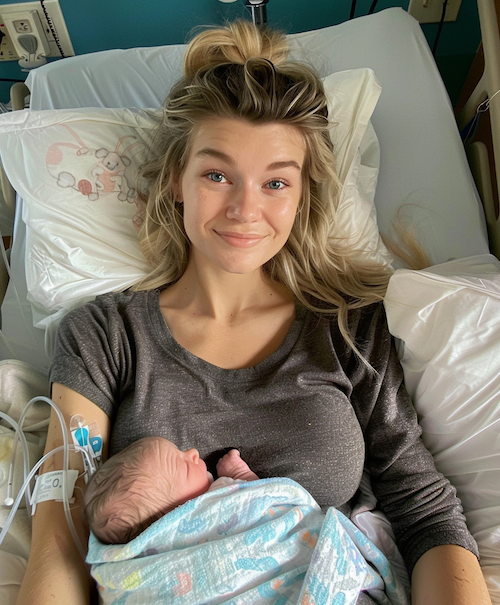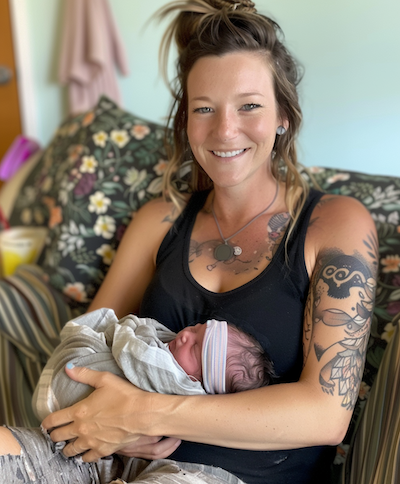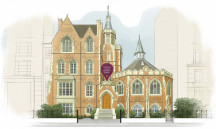-
20 July
-
04 November
-
10 July
-
12 June
-
05 June
-
24 September
-
19 September
-
10 May
-
26 April
Five Mums Share Challenging Childbirth Experiences for Birth Trauma Awareness

Childbirth is often seen as a magical experience, yet for some mothers, it turns into an intense and harrowing struggle. Nearly half of all birthing women experience traumatic childbirth, a common issue that remains largely unspoken.
In the UK, up to 5% of women develop post-traumatic stress disorder (PTSD) after giving birth, which equates to about 30,000 women annually. Many more suffer from symptoms like flashbacks or anxiety without a full PTSD diagnosis. The emotional toll of childbirth can be as significant as the physical pain, leaving new mothers feeling overwhelmed.
Birth Trauma Awareness Week, observed from July 17-23, is an annual campaign by the Birth Trauma Association. Since 2017, this organization has been advocating for those affected by traumatic births. This year’s theme emphasizes the critical need for informed consent during childbirth.
A survey by the Birth Trauma Association revealed that more than 40% of women underwent procedures like vaginal exams or membrane ruptures during labor without giving their consent. "This survey reveals a serious need for change in how we handle consent during childbirth. Women deserve to have a say in every procedure they undergo,” says Kim Thomas, CEO of the Birth Trauma Association.
Eve Canavan, Co-Founder and National Coordinator of Maternal Mental Health Awareness Week at the Perinatal Mental Health Partnership, advises, "Know that it is okay to advocate for yourself. You matter, your birth matters, and keep that at the forefront of your mind. Your voice is the most important during pregnancy and labor."
We spoke to experts about recognizing the signs of birth trauma and finding support. Additionally, we share powerful stories from five mums who bravely opened up about their traumatic experiences to raise awareness and support others who may be suffering in silence.
Understanding Birth Trauma
"Birth trauma refers to the experience of PTSD after birth. PTSD has four main symptoms: reliving the trauma through flashbacks or nightmares; hyperarousal, which means feeling constantly anxious or on edge; avoidance of anything that reminds of the trauma; and negative cognition, including low mood and trouble remembering parts of the traumatic event,” explains Emily Johnson.
The term 'birth trauma' also broadly covers psychological distress and trauma after birth, even if the woman does not meet the full PTSD criteria.
Common Causes of Birth Trauma
The most common causes of birth trauma include severe or unexpected complications during labor and delivery, such as emergency interventions or intense pain. Procedures like emergency C-sections or forceps deliveries, especially without adequate explanation or consent, can heighten feelings of distress. Additionally, a lack of emotional or physical support and feeling out of control during the birth process can contribute significantly to a traumatic experience, leaving lasting emotional scars.
Risk Factors for Birth Trauma
Birth trauma can happen to anyone, regardless of background or circumstance. However, certain factors can increase susceptibility, such as a history of medical interventions, previous trauma (like sexual assault), or complications during delivery. Even births that appear straightforward to others can be traumatic for the mother.
Signs of Birth Trauma
- Flashbacks or upsetting dreams about the birth
- Constant anxiety or being easily startled
- Avoiding things that remind you of the birth
- Difficulty bonding with your baby or feeling detached
- Intrusive or persistent thoughts about the birth
- Trouble sleeping due to anxiety or nightmares
- Excessive concern about your baby’s safety or future births
- Racing heart or trembling when reminded of the birth
- Intense guilt or self-blame
- Reluctance to seek medical care or support
Differentiating Birth Trauma from Postnatal Depression
Though there is an overlap in symptoms, such as anxiety, birth trauma is often misdiagnosed as postnatal depression (PND). Women with birth trauma frequently experience flashbacks or nightmares, a distinct feature from PND. However, some women may suffer from both conditions and require treatment for each.
Personal Stories of Birth Trauma
Emily Williams, EFT Practitioner, Shoreham-by-Sea
“The birth of our first child, Alex, ended in tragedy due to insufficient oxygen during the final stages. Inadequate monitoring and negligence led to an emergency episiotomy, and Alex was taken to cooling in the NICU for 72 hours. After five days, we decided to take Alex off life support after an MRI confirmed minimal brain activity and no hope for the future.
The trauma of Alex's birth, short life, and loss left me with undiagnosed severe PTSD, depression, and immense grief. I numbed my pain with alcohol for the first three months and struggled to find joy. We returned home to an empty car seat and a room full of Alex's clothes and newly decorated bedroom.
The biggest support came from Emotional Freedom Technique (EFT) or Tapping. It transformed my life, stopping flashbacks and healing my heartbreak. Tapping prepared me for a planned caesarean one year after Alex and helped me achieve a Vaginal Birth After Caesarean (VBAC) with our third baby, marking a full-circle healing birth. I trained to be an EFT Practitioner and am now a Practitioner Trainer.
Following Alex's loss, no health professional asked about my emotional wellbeing or warned me about PTSD signs. I support many women recovering from birth trauma, finding it often misunderstood. Birth is a vulnerable time, and women place their trust in professionals.
I believe all professionals should receive trauma-informed training and use appropriate language. Disempowering language can lead women to blame themselves and feel inadequate, impacting their child’s wellbeing and creating long-term stress.”
Holly Williams, Pre/Postnatal Fitness Expert, Dorset
"I remember flicking past the ‘caesarean’ sections of my pregnancy books thinking, 'well I’m not having a caesarean, so I don’t need to read this part.' My labour didn't go as planned, in any way... basically the total opposite to any plans I had. Sadly, at 39 weeks, I was diagnosed with suspected Obstetric Cholestasis, which meant my dreams of spontaneous, unmedicated labour in a midwife-led unit were unlikely unless I could get my baby (Alisa) to make an appearance by 41 weeks.
There were not enough curries, raspberry leaf teabags, bottles of Clary Sage, episodes of Girls, or deep squats in the world that could make my baby (Alisa) arrive on time, so I was booked in for an induction at 41 weeks. After three days of tiring labour, two inductions, and hyper-stimulation, my baby (Alisa) wasn’t happy (neither was I), she was getting tired and her heart rate was rising, and I was rushed for an emergency caesarean. Despite this being a traumatic birth, I honestly know that hypnobirthing, being strong and fit, and having a birth partner who was able to advocate for me (my husband Alex) really helped make this labour more manageable. It will forever be the best day of my life, and I would do it every day for the rest of my life if I had to. This does not mean it was plain sailing, but it meant I used tools to try to manage the situation and my emotions. Every birth is special and precious in some way, even when it doesn’t go to plan."
Keira Miles, Leeds
“I have endometriosis and have had many surgeries, leading to a lot of scar tissue. I was induced and in labour for 17 hours, but the final part came on so quickly that I couldn’t have any pain relief. They said the scar tissue made it more painful for me. It was agony, and while my baby was a miracle, I’m physically and mentally terrified of going through it again. Speaking to other mums, especially those with endometriosis, was incredibly helpful. Conversations and pregnancy apps like Peanut helped me find mums in similar situations. Regular check-ins with my GP were also beneficial. I think postnatal care is largely ignored. Women are expected to immediately take care of their babies with no real recovery time or self-care guidance. There needs to be more focus on how mums and dads can care for themselves. Many end up with postnatal depression, but providing self-care tips and encouraging people to ask for help from day one could make a big difference. A baby needs a village, and we can create our own village through open and honest conversations. Talking about our birth experiences should be natural and encouraged.”
Hanna Moore, Account Manager, Peterborough
“My birth trauma began on Christmas Eve when I was 35 weeks pregnant. After experiencing a normal pregnancy with minor bleeding, I suddenly woke up with intense lower back pain, which persisted into Christmas morning. My partner, Sam, urged me to call the hospital, and I was advised to come in despite initial assessments showing no major concerns. While waiting for a doctor to discharge me, I experienced a severe haemorrhage caused by a placenta abruption, putting both my life and my unborn daughter's life at risk.
In a chaotic and life-threatening situation, my condition rapidly deteriorated, and I was rushed to the operating room. Despite feeling desperate and scared, I advocated for myself by demanding immediate medical intervention. My quick thinking and insistence on urgent care were crucial as the medical team prepared for an emergency C-section. I shouted, 'I consent to everything just get her out now,' determined to save my baby's life. Thankfully, the operation was successful, and baby Imogen was delivered safely.
After the surgery, I learned that my prompt action and the hospital staff's swift response saved both my daughter's life and mine. The medical team explained that had I been discharged earlier, the outcome could have been fatal. Reflecting on this experience, I realized the importance of trusting my instincts and advocating for timely medical attention. This turned a potential tragedy into a Christmas miracle with the healthy birth of Imogen. My advice to others is simple: 'If you ever feel something isn’t right, get it checked
Advocating for Your Birth Preferences
Advocating for your birth preferences can significantly improve your experience and help prevent trauma. Eve Canavan emphasizes taking charge of your own labor.
While pregnant, research your birthing choices (hospital birth, birth center, birthing pool, home birth), pain management options (epidural, gas and air, TENS machines), and potential scenarios if your birth doesn’t go to plan. Create a flexible birth plan outlining your preferences and communicate your wishes to your care team.
During labor, remember that plans may change, and this is not your fault. Speak up about your needs, ask questions, and refuse anything that makes you uncomfortable. A birthing partner can amplify your voice and ensure your concerns are addressed. Informed consent is crucial—ensure your doctor or midwife explains any proposed interventions, their benefits, and potential risks.
Healing from Birth Trauma
Healing from birth trauma involves seeking professional support, such as trauma-focused therapy or counseling, and practicing self-care through mindfulness, rest, and connecting with supportive friends or groups. Educating yourself about trauma and communicating your needs with healthcare providers can also help. Prioritize gentle bonding with your baby and address any physical symptoms with medical professionals. Most importantly, be patient with yourself and recognize that healing is a gradual process, celebrating each small victory along the way.
Supporting Someone Who Experienced a Traumatic Birth
Be understanding and supportive. Offer practical help and listen without judgment. Say, "I'm really sorry you went through this; your feelings are completely valid, and I’m here to support you however you need." Encourage her to seek professional help if she’s ready and reassure her that it’s okay to ask for support.
Getting Support for Your Own Birth Trauma
If you experience a traumatic birth, remember that it is not your fault. Even if you have planned and prepared, things may not always go as hoped.
Eve advises, "After giving birth, reach out to a healthcare professional if you face distressing physical or emotional difficulties such as flashbacks, nightmares, panic attacks, or feelings of detachment from your baby. Help is available through your GP, Perinatal Mental Health Teams, charities, and birth trauma organizations that offer therapy and support. Recovery can seem daunting, but it is possible, and there's no shame in asking for help. You can and will get better."
For support, contact the Birth Trauma Association’s peer support team or join their private Facebook group for a supportive community. Professional therapies, such as trauma-focused CBT or EMDR, can also be very beneficial; discuss these options with your local GP. Additional resources include:
- National Health Service (NHS) Services: Visit the NHS website for mental health resources and local support services
- Postnatal Support Groups: Look for local or online postnatal support groups like Postpartum Support International, Maternal Mental Health Alliance
- Counseling Services: Reach out to a licensed therapist specializing in birth trauma or PTSD
- Helplines: Use confidential helplines such as the Samaritans (116 123) for immediate emotional support
- Online Forums: Join online communities like Mother&Baby #MumTribe for shared experiences and coping strategies
Tags: Birth Trauma Awareness
Last Articles
- Odyssey will open its first UK campus in Marylebone, London, April 2025 - - The award-winning global preschool for children 0-5 ...
Read moreEPIC GLOBAL PRESCHOOL, ODYSSEY, COMING T...
Londonnews554XXXAn award-winning preschool offering from Asia is to open its first campus in London, bringing a new global ‘limitless learning’...
Read moreParenting is no easy task, and for Jordan and Briana Driskell, raising their quintuplets—Zoey, Dakota, Hollyn, Asher, and Gavin&mdash...
Read more0 comments
No messages yet








